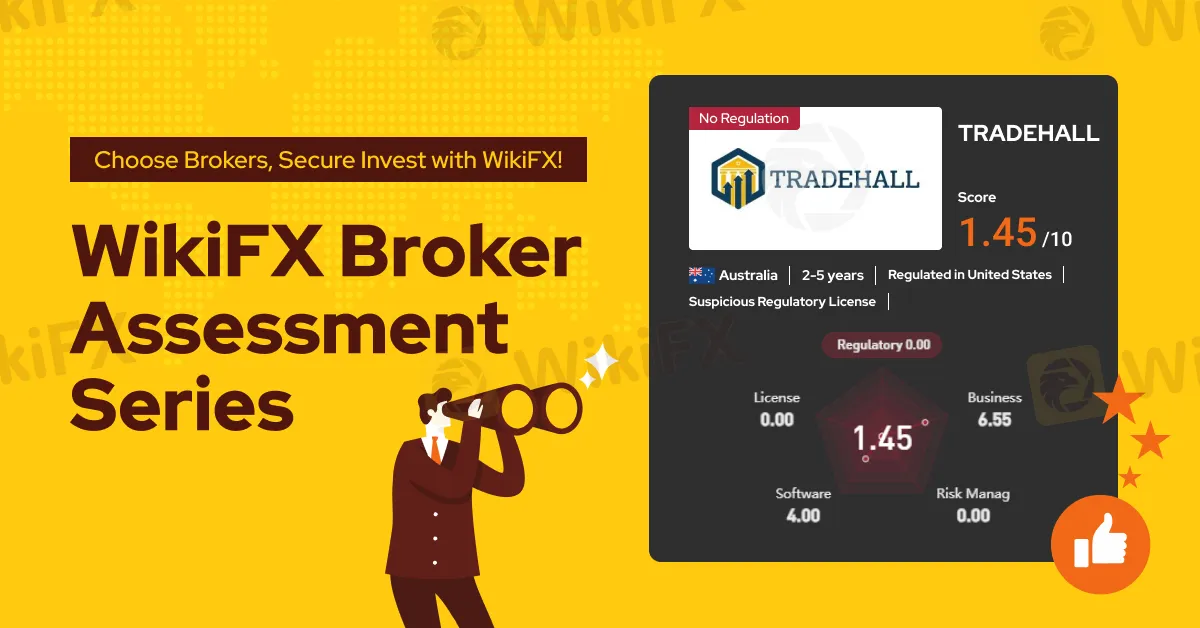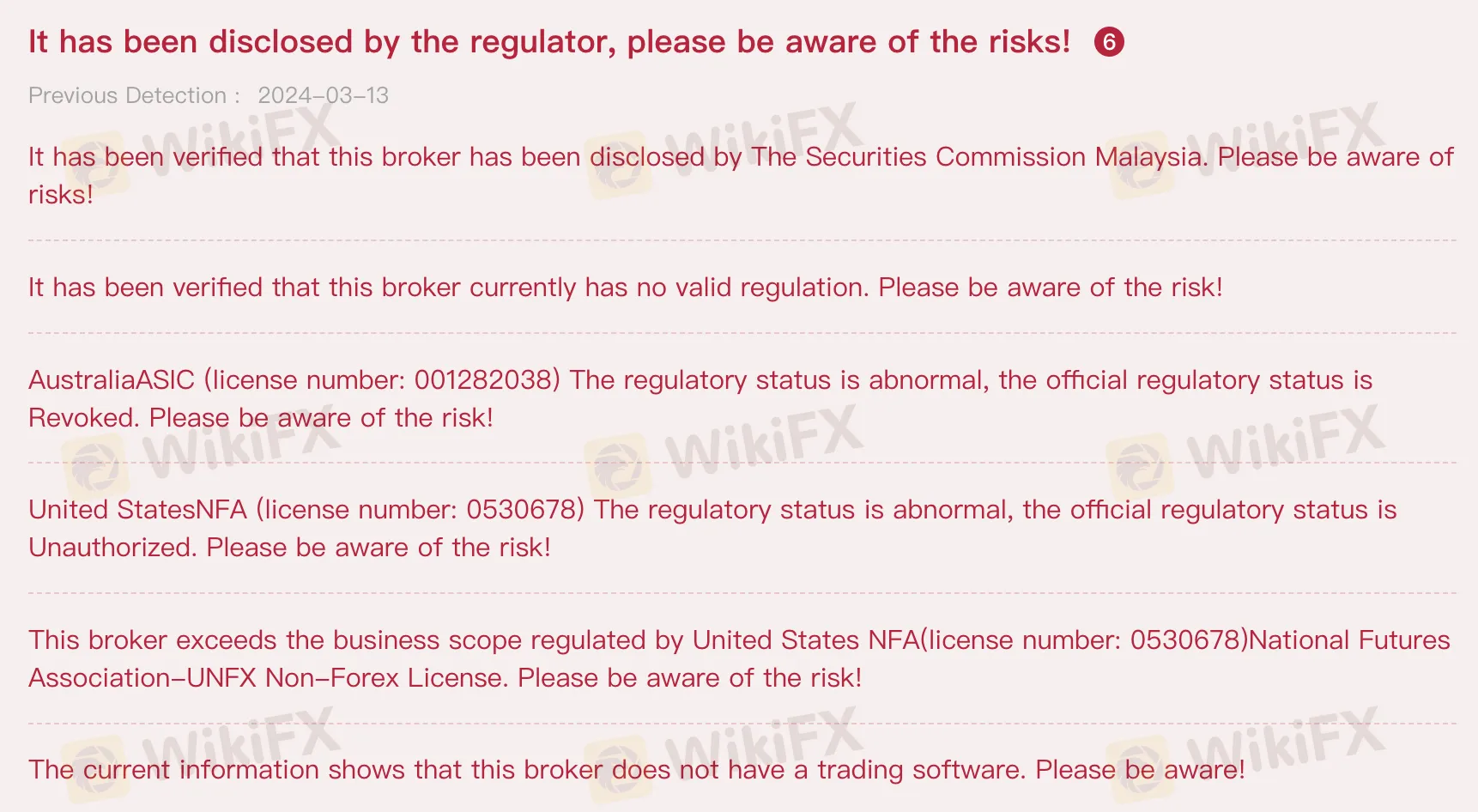简体中文
繁體中文
English
Pусский
日本語
ภาษาไทย
Tiếng Việt
Bahasa Indonesia
Español
हिन्दी
Filippiiniläinen
Français
Deutsch
Português
Türkçe
한국어
العربية
WikiFX Broker Assessment Series | Tradehall: Is It Trustworthy?
Abstract:In this article, we will conduct a comprehensive examination of Tradehall, delving into its key features, fees, safety measures, deposit and withdrawal options, trading platform, and customer service. WikiFX endeavours to provide you with the essential information required to make an informed decision about utilizing this platform.

In this article, we will conduct a comprehensive examination of Tradehall, delving into its key features, fees, safety measures, deposit and withdrawal options, trading platform, and customer service. WikiFX endeavours to provide you with the essential information required to make an informed decision about utilizing this platform.
Background:
Established in 2020 and based in Australia, TradeHall began with the launch of its founders' inaugural online trading service under the trademark TradeHall.
Tradehall offers a diverse range of over 500 tradable assets, encompassing currency pairs, global indices, equities, cryptocurrencies, commodities, and ETFs. Additionally, Tradehall provides clients with a variety of financial services, including personal finance, wealth management, brokerage white labeling, fintech products, and various other financial offerings.

Upon initial observation, Tradehall's official website may seem to have a simple and user-friendly design; however, closer examination reveals a lack of critical information, suggesting a lack of full transparency and candour from this broker.
It is important to note that Tradehall does not currently offer its services to residents of the United States, Germany, the Peoples Republic of China (including Hong Kong SAR), North Korea, Japan, and certain other regions.
Types of Accounts:
The official website of Tradehall lacks a detailed breakdown of the offered account types, as well as their corresponding spreads and charges; instead, there is only a “create live account” button located at the top corner of the website.
Deposits and Withdrawals:
No information about the deposit and withdrawal methods offered is found on Tradehalls official website.
This omission could indicate a lack of transparency because these details are essential for potential clients to make informed decisions about using the platform. Deposit and withdrawal methods are crucial aspects of any trading platform, directly impacting users' ability to fund their accounts and access their funds. Without clear information on these methods, clients may be left in the dark about how they can deposit funds into their accounts or withdraw their profits. This lack of transparency can lead to confusion, frustration, and ultimately erode trust in the platform and its services.
Trading Platforms:
Tradehall provides traders with the MetaTrader 5 (MT5) platform, renowned for its versatility and advanced features. MT5 offers a user-friendly interface and supports trading across various asset classes, catering to both novice and experienced traders. The platform is available in different versions, including the Web Version, Desktop Platform, and Apps, offering flexibility to traders.

Research and Education:
Tradehall's official website does not offer information on research and educational resources.
Customer Service:
At the bottom of Tradehall's official website, it is indicated that clients can reach the broker's customer support team via email using the addresses asia@tradehall.co and support@tradehall.co. Additionally, clients have the option to contact the Asia office directly by phone at +603 48169431. The physical address of Tradehall's Asia office is A-19-2, Tower A, Vertical Business Suite, Bangsar South, No. 8 Jalan Kerinchi, 59200 KL, Malaysia, and Level 33, Australia Square, 264 George Street, Sydney NSW 2000, Australia. It's worth noting that Tradehall does not offer a live chat service.
Conclusion:
To summarize, here's WikiFX's final verdict:
WikiFX, a global forex broker regulatory platform, has assigned Tradehall a WikiScore of 1.45 out of 10.

Despite Tradehall's claims of being a highly regulated and award-winning broker, a thorough examination by WikiFX has revealed that the broker lacks legitimate licenses. Specifically, Tradehall's ASIC license (license number 001282038) has been revoked. Additionally, due to the nature of Tradehall's business exceeding the regulated business scope of the United States NFA, its United States NFA license (license number: 001282038) is unauthorized.



Moreover, Tradehall is listed as an unauthorized entity on Malaysias Security Commission investor alert list.

This low WikiScore signifies that Tradehall is deemed a highly risky broker within the forex trading industry. The assessment is based on the broker's notable deficiencies, including a lack of transparency in providing information on its official website and its status as an unregulated entity operating without a valid license. These factors collectively contribute to WikiFX's verdict of caution regarding Tradehall as a broker. Therefore, WikiFX urges our users to opt for a broker with a higher WikiScore for better protection.

Disclaimer:
The views in this article only represent the author's personal views, and do not constitute investment advice on this platform. This platform does not guarantee the accuracy, completeness and timeliness of the information in the article, and will not be liable for any loss caused by the use of or reliance on the information in the article.
Read more

WikiFX Announcement: Suspension of Weekly Simulated Trading Competition
Since its launch in early 2023, the WikiFX Weekly Simulated Trading Competition has successfully hosted 99 consecutive rounds, attracting enthusiastic participation from traders worldwide and creating countless thrilling trading moments.

What Can Forex Traders Learn from Ne Zha?
The animated blockbuster Ne Zha: Birth of the Demon Child tells the story of Ne Zha’s journey to defy fate and take control of his own destiny. Beyond being an inspiring tale filled with action and character growth, the film conveys profound life lessons - many of which resonate deeply with the world of forex trading.

Retirement Savings Wiped Out: RM500,000 Lost to a Scammer named Richard Ong
A retiree was deceived into parting with more than RM500,000 after falling victim to an elaborate investment scam that promised substantial returns.

The Dark Side of Social Media Investments: How a Manager Lost RM2.08 Million
A Malaysian company manager suffered financial losses amounting to RM2.08 million after becoming the victim of an investment scam promoted through Facebook.
WikiFX Broker
Latest News
Forex Market Outlook: Key Currency Pairs and Trading Strategies for March 24–28, 2025
Singapore Police Crack Down on Scams: $1.9M Seized, 25 Arrested
Gold Prices Swing Near Record Highs
XTB Opens New Dubai Office
The Growing Threat of Fake Emails and Phishing Scams
Africa Cybercrime Bust: Over 300 Arrested in Fraud Crackdown
Hong Kong Banks and Authorities Collaborate to Freeze Fraudulent Accounts Faster
SocialFi and the Forex Market: A New Era for Decentralized Social Trading?
Is Billion Bucks Fx Scam?
BaFin Halts USDe Token Issuance, Citing Serious Compliance Failures
Currency Calculator







